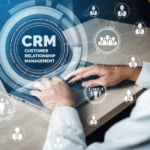Empowering Growth: The Essentials of ERP for Small Businesses
In the dynamic landscape of business operations, small enterprises often face unique challenges that demand innovative solutions. This article explores the pivotal role of Enterprise Resource Planning (ERP) for small businesses, elucidating its key benefits, considerations, and practical insights. Whether you’re a budding entrepreneur or a small business owner looking to optimize operations, this guide provides a comprehensive overview of how ERP can be a game-changer for small enterprises.
Definition and Core Functions
Enterprise Resource Planning (ERP) for small businesses involves the integration of various business functions into a centralized system, providing a unified platform for managing processes. Core functions typically include finance, human resources, supply chain, and customer relationship management. Unlike large enterprises, small businesses can benefit from ERP solutions tailored to their specific needs and scale of operations.
Tailored Solutions for Small Business Needs
ERP solutions for small businesses are designed to address the unique challenges faced by smaller enterprises. These solutions often offer scalability, affordability, and user-friendly interfaces, enabling small businesses to streamline operations, enhance efficiency, and remain competitive in their respective industries.
Key Benefits of ERP for Small Businesses
- Streamlining Operations and Workflows
One of the primary benefits of ERP for small businesses is the streamlining of operations and workflows. By centralizing data and processes, small businesses can eliminate manual tasks, reduce errors, and improve overall efficiency. - Enhancing Data Accuracy and Decision-making
ERP systems provide small businesses with accurate and real-time data. This enables informed decision-making, as business owners can rely on up-to-date information to assess performance, identify trends, and make strategic choices. - Improving Customer Relationship Management (CRM)
Effective CRM is crucial for small businesses, and ERP systems often include modules dedicated to managing customer relationships. This includes tracking interactions, managing sales leads, and ensuring personalized communication to enhance customer satisfaction. - Scalability for Future Growth
Small businesses can start with basic ERP modules and scale up as they grow. This scalability ensures that the ERP system grows alongside the business, accommodating increased data volume, user expansion, and additional functionalities.
Considerations for Small Businesses Implementing ERP
- Budget Constraints and Cost-effective Solutions
Small businesses often operate with limited budgets. When implementing ERP, it’s essential to choose cost-effective solutions that provide the necessary functionalities without unnecessary complexities. Cloud-based ERP solutions, with their subscription-based models, can be particularly suitable for small businesses with budget constraints. - User-Friendly Interfaces and Ease of Adoption
The success of ERP implementation in small businesses relies on user adoption. Choosing ERP solutions with user-friendly interfaces and providing adequate training ensures that employees can easily adapt to the new system, minimizing resistance to change. - Cloud-based vs. On-Premises ERP Solutions
Small businesses need to decide between cloud-based and on-premises ERP solutions. Cloud-based solutions offer accessibility from anywhere with an internet connection, while on-premises solutions provide greater control but may require higher upfront investments. The choice depends on factors such as business needs, budget, and IT infrastructure. - Integration with Existing Systems
For small businesses with existing systems, seamless integration is crucial. The chosen ERP solution should be compatible with current software and applications, minimizing disruptions to ongoing operations.
Real-world Applications of ERP for Small Businesses
- Success Stories Across Industries
Small businesses in various industries, including retail, manufacturing, and services, have experienced significant success with ERP implementation. These success stories highlight how ERP has contributed to improved efficiency, cost savings, and enhanced competitiveness. - Impact on Efficiency and Competitiveness
ERP for small businesses has a direct impact on efficiency, allowing businesses to operate with leaner processes. This enhanced efficiency contributes to increased competitiveness, enabling small enterprises to deliver products and services more effectively than their counterparts without ERP systems.
Future Trends in ERP for Small Businesses
- Mobile Accessibility and Flexibility
The future of ERP for small businesses involves increased mobile accessibility. Mobile ERP applications allow business owners and employees to access critical information on the go, fostering flexibility and responsiveness. - Integration with E-commerce Platforms
With the rise of e-commerce, small businesses are increasingly integrating ERP with their online platforms. This integration ensures a seamless flow of data between the ERP system and e-commerce operations, optimizing order processing, inventory management, and customer interactions. - Data Security and Compliance
As data security concerns grow, future ERP solutions for small businesses will prioritize robust security features and compliance measures. Ensuring the protection of sensitive business data is paramount, especially in industries with stringent regulatory requirements.
Selecting the Right ERP for Your Small Business
- Assessing Specific Business Needs
The first step in selecting the right ERP for a small business is to assess specific needs. This involves understanding the core processes, identifying pain points, and determining the functionalities required for efficient operations. - Customization Options for Small Enterprises
While customization is essential, small businesses should balance their need for tailored solutions with the simplicity of implementation. The chosen ERP system should allow for necessary customizations without becoming overly complex or costly. - Vendor Reputation and Support Services
The reputation of the ERP vendor is critical. Small businesses should research vendor reviews, seek recommendations, and assess the level of support services offered. A reliable vendor with a track record of supporting small enterprises enhances the chances of a successful ERP implementation.
Steps to Implement ERP for Small Businesses
- Start with a Comprehensive Needs Assessment
Before implementing ERP, small businesses should conduct a comprehensive needs assessment. This involves identifying current pain points, defining objectives, and understanding specific requirements. The needs assessment guides the selection of appropriate ERP modules and customization options. - Phased Implementation and Training
Phased implementation allows small businesses to gradually adopt ERP functionalities. This approach minimizes disruption to daily operations and provides employees with time to adapt. Training programs should be tailored to the needs of small business users, emphasizing practical application and real-world scenarios. - Ongoing Support and Optimization
Post-implementation, small businesses need ongoing support to address any challenges and optimize system performance. This includes regular updates, troubleshooting assistance, and access to support services from the ERP vendor.
ROI Analysis with ERP for Small Businesses
- Measuring Cost Savings and Operational Efficiency
Measuring the return on investment (ROI) involves assessing the cost savings achieved through ERP implementation. Small businesses should evaluate reduced manual efforts, streamlined processes, and improved operational efficiency as key metrics. - Tracking Improved Customer Satisfaction
ERP’s impact on customer satisfaction is a crucial aspect of ROI analysis. Small businesses can track improvements in customer interactions, order processing times, and overall service quality to gauge the positive impact of ERP on customer satisfaction. - Assessing Return on Investment for Small Businesses
The overall return on investment for small businesses extends beyond financial metrics. It includes improvements in productivity, employee satisfaction, and the ability to compete more effectively in the market. Small businesses should assess both quantitative and qualitative factors in determining ROI.
Testimonials from Small Business Owners Using ERP
- Insights from Businesses
Gathering insights from small business owners who have successfully implemented ERP provides valuable perspectives. Testimonials offer real-world experiences, lessons learned, and practical tips for small businesses considering or undergoing ERP implementation. - Lessons Learned and Practical Tips
Analyzing lessons learned from small business ERP implementation and best practices shared by users contributes to a smoother deployment. Understanding the challenges faced by others and the strategies employed to overcome obstacles offers valuable guidance for small businesses embarking on their ERP journey.
Common Misconceptions about ERP for Small Businesses
Dispelling Myths and Clarifications
ERP for small businesses may be subject to misconceptions, such as concerns about complexity, cost, or suitability for smaller operations. Dispelling these myths helps set realistic expectations and encourages small businesses to explore the potential benefits of ERP.
Expert Opinions on ERP for Small Businesses
Insights from ERP Experts and Industry Analysts
Seeking insights from ERP experts and industry analysts provides a broader perspective on trends, best practices, and the evolving landscape of ERP for small businesses. Expert opinions contribute to informed decision-making and help small businesses stay ahead of industry developments.
Conclusion
- Recap of ERP’s Impact on Small Businesses
In conclusion, ERP stands as a catalyst for growth and efficiency in the realm of small businesses. From streamlining operations to enhancing customer relationships, ERP empowers small enterprises to compete effectively in today’s dynamic business landscape. - Encouragement for Small Businesses to Embrace Operational Excellence
As small businesses navigate the challenges of growth, embracing ERP as a tool for operational excellence becomes a strategic imperative. The potential benefits of improved efficiency, data-driven decision-making, and scalability position ERP as a key enabler for small businesses to achieve sustainable success.
FAQs
- Can ERP systems be customized to suit the specific needs of small businesses?
Yes, many ERP systems offer customization options to tailor the software to the specific needs of small businesses. Customization ensures that the ERP system aligns with the unique processes and requirements of the business. - How does ERP contribute to cost savings for small enterprises?
ERP contributes to cost savings by automating manual processes, reducing errors, and optimizing resource allocation. Small businesses can experience reduced operational costs, improved productivity, and better decision-making, leading to overall financial efficiency. - Is cloud-based ERP more suitable for small businesses than on-premises solutions?
The suitability of cloud-based or on-premises ERP depends on factors such as budget, IT infrastructure, and accessibility needs. Cloud-based ERP is often preferred by small businesses for its lower upfront costs, scalability, and remote accessibility. - What steps can small businesses take to ensure a smooth ERP implementation?
Small businesses should start with a comprehensive needs assessment, choose a user-friendly ERP system, conduct phased implementation, and provide thorough training for employees. Ongoing support and collaboration with the ERP vendor are essential for a smooth implementation. - How does ERP address data security concerns for small enterprises?
ERP systems incorporate robust security measures, including data encryption, access controls, and regular security audits. Small businesses should choose ERP vendors with a strong focus on data security and compliance with industry standards










